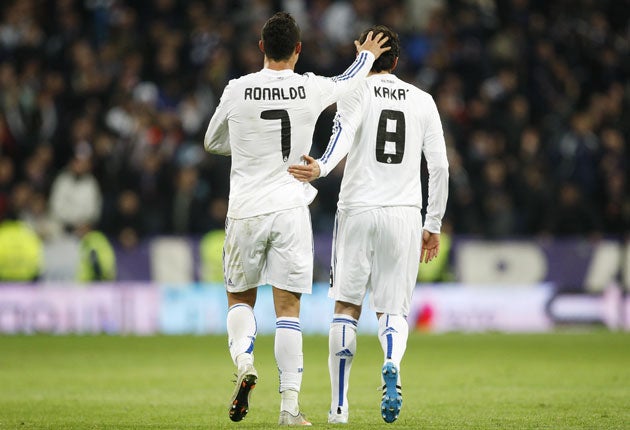Ronaldo, Kaka and the April Fool that has (almost) come to pass

Your support helps us to tell the story
From reproductive rights to climate change to Big Tech, The Independent is on the ground when the story is developing. Whether it's investigating the financials of Elon Musk's pro-Trump PAC or producing our latest documentary, 'The A Word', which shines a light on the American women fighting for reproductive rights, we know how important it is to parse out the facts from the messaging.
At such a critical moment in US history, we need reporters on the ground. Your donation allows us to keep sending journalists to speak to both sides of the story.
The Independent is trusted by Americans across the entire political spectrum. And unlike many other quality news outlets, we choose not to lock Americans out of our reporting and analysis with paywalls. We believe quality journalism should be available to everyone, paid for by those who can afford it.
Your support makes all the difference.When The Independent exclusively revealed that the Portuguese government was preparing to sell Cristiano Ronaldo to the highest bidder to solve its sovereign debt crisis the story could only have been published on one day – 1 April.
Yet our outlandish spoof now seems to have come true, at least in part. But rather than the sovereign state of Portugal, it is the Spanish banking group Bankia that has apparently put up Ronaldo, the world's most expensive footballer, as collateral as they try to secure loans from the European Central Bank (ECB).
Bankia is in a position to do this because it, in turn, has lent money to Real Madrid, which has offered its star players Ronaldo and Brazilian midfielder Kaka as security for the loan. Bankia helped finance Real Madrid's acquisition of the pair by loaning the club €76.5m (£67m), a substantial contribution to the €100m paid to Manchester United for Ronaldo, and the €60m it cost to extract Kaka from AC Milan.
The latest move opens the curious possibility that, if Real Madrid defaults in its repayments to Bankia, and the Spanish bank then defaults on its loan repayments to the ECB, the ECB in Frankfurt would be in possession of two-elevenths of one of the strongest teams in the world (plus nine from the ECB's Sunday afternoon amateur squad of central bankers and economists, men whose brains are not in their feet). Whether ECB President Jean-Claude Trichet would be prepared to take on coaching duties on top of his already enormous responsibilities in trying to keep the single currency alive is a moot point. More sensible, probably, to keep the pair at their present club.
Conversely, if the deal goes ahead without any hitches, then the ECB will be indirectly funding another predatory attack by Real Madrid on its major competitors, poaching the best payers with the backing of a supra-national bank – not exactly a "level playing field" for Manchester United, let alone Stoke City. More poignantly, it means the taxpayers/fans of leading eurozone clubs such as Bayern Munich, Ajax and Paris Saint-Germain are effectively helping Real secure its unrivalled supremacy in European football at their expense. The resentments felt in Germany and the Netherlands over the deal may soon prove as potent as those felt about the bailouts to Greece, Portugal and Ireland in the economic sphere.
With the ECB acquiring a bizarre financial interest in Spain's leading club, the question may soon arise as to how far it will go to support Bankia and Real Madrid if they run into trouble, on the pitch or in the money markets. The question the ECB must now face is: is Real Madrid too big to fail?
Join our commenting forum
Join thought-provoking conversations, follow other Independent readers and see their replies
Comments